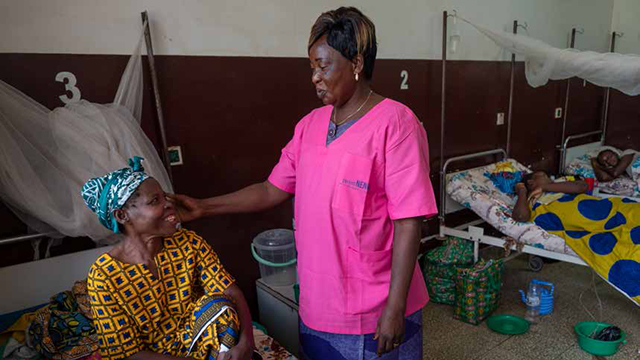Treatment for women victims of sexual violence
— Democratic Republic of the Congo —

BACKGROUND
The South Kivu region of the Democratic Republic of the Congo (DRC) has been a conflict zone since 1999. Many armed groups there have been taking violent action against the civilian population with near impunity, particularly women, using rape as a weapon of war. Dr Denis Mukwege, founder of the Panzi Hospital, centrally located in this region, has been dedicating his life to saving women who are victims of these atrocities and denouncing sexual violence.
The Panzi Hospital provides centralised treatment based on a holistic model of a one-stop centre and comprising medical, psychological, socio-economic and legal support. Since its implementation, nearly 50,000 victims of sexual violence have been treated there.
On 6 December 2017, Dr Mukwege presented a proposal to the Fondation Pierre Fabre Board of Directors to replicate his comprehensive model for victim care services at the Bulenga Hospital.
The Bulenga Hospital is 165 kilometres from Panzi in a conflict-stricken area. It has 62 beds and currently treats 1,800 patients a year, but lacks needed human and material resources. Being in a markedly poor region where only a third of inhabitants has access to drinking water, the hospital makes low-cost treatment available to the entire population, offering a specific course of treatment for women who are victims of sexual violence and those suffering the consequences of unmonitored pregnancy (prolapse, obstetric fistulas). The hospital, built on a large section of land that makes future expansion possible, was designed to be autonomous in electricity (solar panels) and drinking water (spring water pumped and distributed via reservoirs and the facility’s own network). Its departments include internal medicine, paediatrics, gynaecology, surgery (simple cases, with others referred to Panzi), a maternity ward, an analysis laboratory and a pharmacy.
On 28 May 2018, a delegation from the Fondation Pierre Fabre travelled to the site and saw first-hand the tremendous need for such a facility, as well as the quality of the treatment structures and the skills of the Panzi and Bulenga staff. Since then, the Foundation’s support has made possible free medical and psychological treatment for women. A victim shelter was also built and the Foundation will provide support for the hospital’s operations.
Ultimately, the expected results include:
– Access to medical and psychological treatment at the Bulenga Centre for victims of sexual violence and other women in need of specialised gynaecological care;
– Patient support for psychosocial reintegration;
– Data collection, compilation and storage on treated patients;
– Patient access to legal aid at the Panzi legal clinic.
Discover below the report made at the Bulenga hospital :
KEY FACTS
_____
Priority
Access to quality healthcare
Programme
Since 2017
Objectives
- Provide care and protection by looking aftervictims and reinforcing the sexual and reproductive healthcare package
- Inform and raise awareness among community stakeholders
- Support the Panzi Foundation to help it replicate the holistic model for supporting victims
- Reinforce Bulenga Hospital’s status as a reference centre in the Minova health district.
THE LATEST PROGRESS
_____
Medical care
1,848 female users of sexual and reproductive health services, 125 victims cared for and 346 people given shelter at the safe house.
Upgrading of equipment
Start of renovation work in the operating theatre and maternity ward, construction of accommodation for women in labour and staff.
Boosting staff numbers
Recruitment of 3 midwives and 2 community welfare officers, training for physicians in emergency obstetric care.
Awareness-raising among communities
175 sessions held, attended by 6,378 people, 24 radio programmes and 240 advertising clips broadcast every month since August.
Panzi Foundation
Avenue Jean Mirhuho 3, Mushununu, Bukavu,
Democratic Republic of the Congo-Kinshasa
CURRENT STATUS AND FORECAST
Current Status
1
shelter was built for victims
545
patients have received free treatment
3000+
people have been informed about sexual and gender-based violence during public awareness sessions
Forecast
At the end of these two years of funding, the Fondation Pierre Fabre will conduct a mission assessment to determine how to make this structure sustainable over the long term.

To provide medical care to women in Bulenga, I asked for assistance from the Fondation Pierre Fabre, well-known for its medical work and support of many initiatives to improve access to health care. I am delighted to be receiving the Foundation’s aid.”
Dr Denis Mukwege
See also
NENGO: care for victims of sexual and gender-based violence
Despite its wealth of natural resources, the Central African Republic is among the poorest nations on earth, ranking 188th out of 189 countries, according to the Human Development Index. In this land racked by conflict for nearly twenty years, there are tens of thousands of women and girls that have been victims of sexual violence.
13/01/2020See also
Improving access to quality healthcare for people in the least-developed countries
The project is designed to strengthen the quality of health care given refugees and the poorest Lebanese populations through the health care structures and Mobile Medical Units of the Lebanese Association of the Knights of Malta.
06/04/2020Suivre notre action
Mobile Clinics in the Central African Republic: Caring for Survivors of Violence
This unique initiative in the Central African Republic enables thousands of women to access crucial healthcare services and rebuild their lives.





